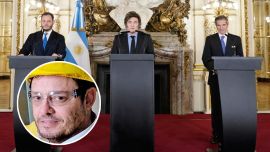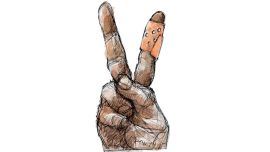Illustrating Argentina’s redefined foreign policy approach under President Alberto Fernández, the government made two big calls this week on Venezuela.
First up, the government condemned the “harassment” of Juan Guaidó and others in a toughly worded statement from the Foreign Ministry, after farcical scenes at Venezuela’s National Assembly, in which the opposition leader attempted to scale the outer walls of the legislature’s complex after being, seemingly prevented from being allowed in.
Secondly, more than 7,000 kilometres away in Buenos Aires, the Foreign Ministry was in the process of withdrawing the “special mission” status granted to Elisa Trotta Gamus – the envoy representing Guaidó in Argentina – by former president Mauricio Macri.
Both steps were symbolic and seemed dramatic and decisive, but ultimately, they’re likely to end up as just details. They are, however, revealing and worth a closer look.
BLOCKAGE
Back to the blockage. Guaidó, the 36-year-old pretender to Nicolás Maduro’s well-reinforced throne, had attempted to gain access to the legislature for a key vote in which he hoped his term as speaker (and therefore the legitimate president of Venezuela, according to his logic) would be renewed.
Instead, he found himself blocked from entering and ended up holding an impromptu vote in the offices of a opposition-friendly newspaper.
At first glance, the ‘Grapple at the Gates’ all seemed to be a bit of a show on both sides: the Bolivarian security forces enjoying sticking it to the self-proclaimed wannabe leader and the opposition winning themselves some great PR that was quickly beamed across the continent and gleefully swallowed up by network producers. Not to mention one or two heroic-looking soon-to-be stock photos of Guaidó for the international news agencies that cast him as the Rebel With a Cause.
(While we’re here, news outlets, both local to Venezuela and beyond its borders, were unclear in establishing exactly what happened. The opposition says Maduro’s thugs blocked Guaidó from entering, while other reports suggested he had permission to enter, but that actually two other lawmakers accompanying him did not.)
Unfortunately though, there was quite a fair bit at stake, as we were reminded when corruption-tinged lawmaker Luis Parra moved to claim the leadership of the only non-Maduro-led body left for himself. Guaidó’s allies, including the United States and the members of the Grupo de Lima, condemned the events. Soon after, Argentina was following suit.
“To impede by force the functioning of the legislative assembly is to condemn oneself to international isolation,” Foreign Minister Felipe Solá charged in via Twitter.
“The acts of harassment suffered by deputies, journalists and members of the diplomatic corps when attempting to enter the premises of the National Assembly, to elect the new authorities of its board of directors, are unacceptable for democratic coexistence,” boomed a statement from the Foreign Ministry.
Here, one month into the presidency, was some strongly worded stuff from Team Fernández. It was also faithful to the foreign policy he’d described on the campaign trail, the so-called ‘third way’ that sees a hell of a lot wrong in Venezuela (not enough mind to upset the Kirchnerite wing of the coalition) but doesn’t see a “dictator.” A slap on the wrist, but one not coated in a glove made in America, if you like.
Some of the opposition were cheered, others (it’s easy to guess who) thought it didn’t go far enough. Washington was certainly pleased enough, with its special representative for Venezuela, Elliot Abrams, breaking ground to thank Argentina and Mexico for their strong words.
However, not too long later, another move was grabbing the headlines.
CLARIFICATION
Amid howls from the opposition, who demand a harder line on Nicolás Maduro’s disastrous leadership of the crisisstricken Caribbean-tinged country, the Foreign Ministry confirmed that Elisa Trotta Gamus had been sent “a formal note" clarifiying the government’s stance on her “special mission” in Argentina.
The envoy was not “a formal ambassador for Venezuela,” officials confirmed.
Opposition politicians were quick to criticise the move. Former security minister Patricia Bullrich described the decision on Twitter as putting Argentina “on the dark side of the story.”
“Evidently the ‘third position’ did not withstand the pressure of the historically Chavista position,” the PRO party leader added, implying the more ideological members of the Peronist coalition had been behind it.
From the lower house, the Juntos por el Cambio caucus called on the government to “reaffirm its membership of the Grupo de Lima and condemn the Venezuelan dictatorship.” The group, chaired by UCRRadical leader Mario Negri described the government’s position on Venezuela as “contradictory” and accused the Peronist administration of “generating uncertainty.”
Trotta Gamus, who was born in Caracas in 1982, is the daughter of Alberto Trotta, an Argentine lawyer who sought exile in Venezuela one year before Argentina’s brutal 1976- 1983 military dictatorship took power.
She took the decision pretty well. In a statement, she said she respected President Fernández’s decision to remove her credentials and hoped Argentina would continue to denounce human rights violations in Venezuela. “We respect the sovereign decisions of Argentina,” she said.
Later, in comments made to Radio La Red, she asked President Fernández to “chart a course together” that would allow democracy “to be recovered” in Venezuela.
“The more time that passes, we put the lives of thousands and thousands of Venezuelans at risk. It’s not the time to delay,” she added. “This has nothing to do with the ideology or the policy, but with the humanitarian.
”Venezuela is an issue that, much like everything else in this godforsaken world of late it seems, divides everyone. But only the most ideological are refusing to accept the shocking state of affairs in the country. Just one stat: around 4.8 million Venezuelans have left their homes to date, with that number expected to reach 6.5 million by the end of 2020, according to UN estimates.
“The Venezuelan community has almost 200,000 members [in Argentina] and is expected to keep growing if there is no change,” warned Trotta this week, describing Maduro as “a dictator” who was “tormenting Venezuela.”
As the week drew to a close, events in Venezuela seemed to have calmed a little – as perhaps have attitudes have in Washington. On Friday, the US offered a strong hint that it was now leaning towards peace talks.
“A swift negotiated transition to democracy is the most effective and sustainable route to peace and prosperity in Venezuela,” US Secretary of State Mike Pompeo said in a statement. “Negotiations could open the path out of the crisis through a transitional government that will organise free and fair elections.”
Such a move would surely be backed by Argentina’s own government, given its newly defined stance that echoes the path of dialogue touted repeatedly by Uruguay and Mexico. But would Maduro’s ideological allies in the Peronist government accept a negotiated transition?
Underlining the difficulties in finding a common position on the crisis, Chaco Governor Jorge Capitanich – a former Cabinet chief under Cristina Fernández de Kirchner – offered his thoughts as to why the Maduro administration is not a “dictatorship.”
“One can have a qualitative difference in terms of authoritarian bias, but that does not amount to a dictatorship,” the Peronist politician told Radio La 990, adding that it was “necessary to respect” bodies such as the National Assembly, but that it was “another thing to pretend to recognise” a “Presidency that does not exist.”
It’s become fashionable of late to describe Fernández’s governance of Argentina in these first few months as akin to walking a tightrope, and there’s a lot in the analogy to like. The former Cabinet chief, so used to resolving problems himself, is now the man tasked with keeping everyone happy – whether it be Washington and the IMF, or Cristina and the Kirchnerites.
But perhaps, rather than a tightrope, it is more like a tug-of-war with multiple ropes – he just has to hope the fine lines and complications don’t rip him apart.


























Comments